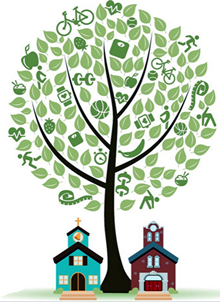About a month ago, the Centers for Medicare and Medicaid Services (CMS) issued new guidelines that advocate family visitors to return to nursing homes. At this time only three states are not allowing visits. The guidelines provide specifics on how to visit a family member while remaining safe. Unfortunately, it still means making tough choices between a resident’s mental and physical health.
Reducing Social Isolation
These guidelines highlight the need for residents in long-term care to see family members and loved ones. With these guidelines in place, it helps to bring loved ones back together. What about caring for family members who remain at home? What are the recommendations for keeping everyone at home safe?
Guidelines for Home Visits
In May 2020, AARP published an article on steps to take in safely visiting older family members in their home. Those steps included keeping visits short and wearing protective masks and eyewear when possible. The article also suggested staying away if you feel sick, keeping younger family members away for the time being, and visiting while outside.
Making Tough Choices
Despite the good intentions of these guidelines, serious questions are raised. How are caregivers managing? They are making decisions based on what is best for their family members while balancing issues of safety, health, and protection. These kinds of decisions are not new in caregiving.
The combination of trying to provide care while maintaining social distance and health is even more difficult. And caregivers are also conflicted about bringing love ones into a nursing home and out of the home environment, even though it may be the best possible option.
Lessons Learned?
The COVID-19 pandemic highlights the overwhelming need to address caregiving and those who provide it. We need to take the lessons learned from this ongoing experience and make better options for caregivers, both paid and unpaid. Caregivers continue to continue to give their best. It’s more than past the time to focus on their needs and provide better choices.
Kathy Dreyer, Ph.D., is an Advisor at AGE-u-cate® Training Institute, which develops and delivers innovative research-based aging and dementia training programs such as Dementia Live® and Compassionate Touch®, for professional and family caregivers; kathy.dreyer@ageucate.com


 Julie has worked in Aging Services for over 30 years and has been a Licensed Nursing Home Administrator since 1990. She is a Certified Master Trainer with the
Julie has worked in Aging Services for over 30 years and has been a Licensed Nursing Home Administrator since 1990. She is a Certified Master Trainer with the 
 Beth is a Certified Master Trainer with the
Beth is a Certified Master Trainer with the  Caring for people with dementia requires specialized communication skills training. Unfortunately, healthcare professionals and family caregivers often receive little training to enable them to meet the communicative needs of people with dementia.
Caring for people with dementia requires specialized communication skills training. Unfortunately, healthcare professionals and family caregivers often receive little training to enable them to meet the communicative needs of people with dementia.